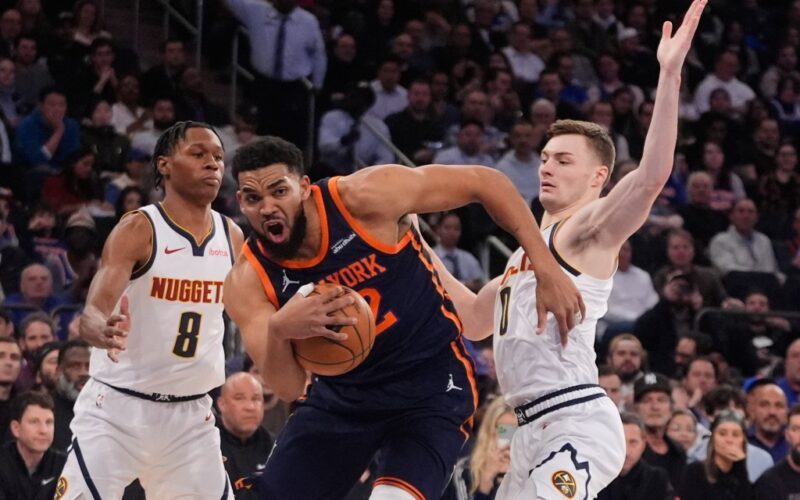Runs are inevitable in the NBA. Every team goes on one.
They are the natural rhythm in the course of a game — momentum swings that can shift the balance in an instant.
But how a team responds to those runs often dictates the outcome.
The Knicks have been on both sides of that equation this season. And on Wednesday night against the 2021 NBA champion Denver Nuggets, they once again found themselves in the teeth of an opponent’s surge.
After controlling the first quarter, the Knicks watched Denver flip a 12-point deficit into an eight-point lead midway through the third.
The Nuggets were riding momentum, threatening to blow the game open.
And then it happened. The Knicks shut it down.
As New York has ascended to the hottest team in basketball, riding a league-best five-game winning streak into Saturday’s matchup against the Los Angeles Lakers, they’ve unlocked a new gear on the defensive end.
They are not just stopping opponents — they are stopping them when it matters most.
That’s been the difference during this stretch: the ability to smother a team’s momentum before a run gets out of control.
The Knicks are now dictating games, rather than reacting to them.
“I think there’s times where it’s time to buckle down defensively, switching, and we’re doing it properly,” said Knicks forward Josh Hart. “We’re communicating, we’re not giving up slip layups or threes behind the screen. We’re communicating at a high level and just making teams see bodies.
“Earlier we were winning games with our offense. Now, I think we’re starting to win games with our defense.”
* * *
There’s no “D” in fast break points, but every transition bucket begins with a stop.
And the Knicks? They are getting stops. The proof is in the numbers.
Over their last five games, the Knicks lead the NBA in both points off turnovers (25.2 per game, tied with Minnesota) and fast break points (22.2, tied with Denver).
At Madison Square Garden, New York is weaponizing its defense, turning stops into easy baskets.
And crucially, they’re doing it in the most important moments — when an opponent tries to claw its way back into the game.
“I think the communication is better. Not so many stupid mistakes,” said Hart. “We’ve realized a lot of the mistakes were us not communicating, not talking at a high level. We fixed that and now we’re just continuing to play.”
The Nuggets found that out the hard way.
After Michael Porter Jr. pushed Denver ahead by eight midway through the third quarter, the Knicks snuffed out their run.
Hart missed a layup on one end — an opportunity for Denver to push in transition. But Mikal Bridges, Karl-Anthony Towns and OG Anunoby sprinted back on defense, cutting off Porter Jr.’s driving lanes.
He settled for a pull-up jumper. Miss.
The ball found its way to Jalen Brunson, who took it coast-to-coast for a quick layup before the Nuggets could set their defense.
Momentum: halted.
On the next possession, Denver’s Jamal Murray, the hot hand with 33 points on the night, looked to attack. Towns got switched onto him — a 7-footer trying to guard a 6-4 scoring machine on the perimeter.
But Bridges left Nikola Jokic — on a poor shooting night — to help on Murray, and by the time Murray saw the double and tried to feed Jokic, Anunoby was already in the passing lane.
Steal. Transition take foul. Free throw. Knicks ball.
“Just getting stops. Getting a turnover, getting out in transition, getting an easy score,” Anunoby said. “It just kind of deflates the other team.”
Towns had a dunk blocked on the next possession, but again, the Knicks sprinted back on defense. This time, Anunoby forced the ball out of Porter Jr.’s hands.
Out of bounds. Knicks ball.
As Porter Jr. barked at the officials, Hart raced down the floor for an easy transition bucket.
Timeout, Denver. A 12-point lead erased in seconds.
“We stopped the bleeding. Just good execution,” Towns said. “We’ve done a great job of — when teams hit some big shots, hit some 3s, we respond immediately, whether it’s getting an easy one, JB [Jalen] doing what he does best, coming off a pick-and-roll, bounce pass … things like that.
“We’ve got a lot of talent in here, but great teams know when to put the talent aside and just execute. That’s what we’ve been doing.”
* * *
Denver wasn’t the first victim.
This has been a common thread through the Knicks’ five-game streak.
Against Memphis? The Knicks built a 13-point lead in the first quarter, saw the Grizzlies cut it to three late in the period — then pushed it back to 11 in just over a minute.
Later, Memphis got within three points again before halftime. The Knicks responded by holding them scoreless for the final 90 seconds to take an eight-point lead into the break.
They went on to force seven fourth-quarter turnovers and blew the Grizzlies out, 143-106.
Against Sacramento?
The Kings had won 10 of their last 12 games before meeting the Knicks. They cut a 13-point deficit down to five before halftime.
In response?
The Knicks forced eight second-half turnovers, including six in the fourth quarter alone, en route to a 25-point win.
Part of it is the built-in advantage of The Garden. After all, these games have been on home turf. The crowd feels the momentum swings and feeds the defense energy.
“I think it’s a mixture of us and a mixture of the crowd as well,” said Brunson. “I say it all the time, this place is the best place to play, and the way they back us definitely helps. Obviously, we do our part, but they’re just as much a part of it as well.”
But a larger part of it is a team learning how to impose its will defensively.
The Knicks are no longer just outscoring teams. They are snuffing them out.
And while Tom Thibodeau won’t celebrate any victories in January, he knows exactly what this stretch is showing him.
Stopping the bleed. Stopping the runs. And winning games.
It’s what great teams do. And the Knicks?
They might just be one.
“It’s a good win, and we don’t want to get carried away with ourselves, but there’s things that we have to continue to improve upon,” Thibodeau said. “I think these are all good tests for us. It tells us exactly where we are and what we have to work on to get better, and not to be satisfied and to always have the belief that we can do things better.
“I think this team does. We have a committed group that’s willing to sacrifice for each other and play for each other, and when that happens, good things follow.”








